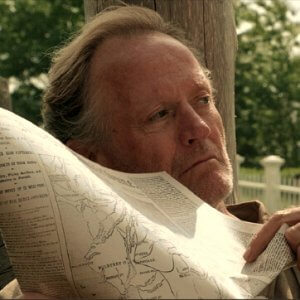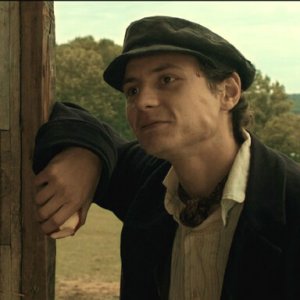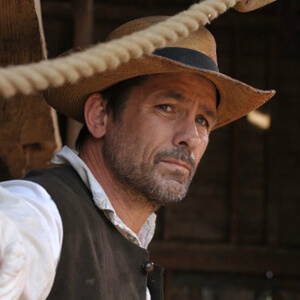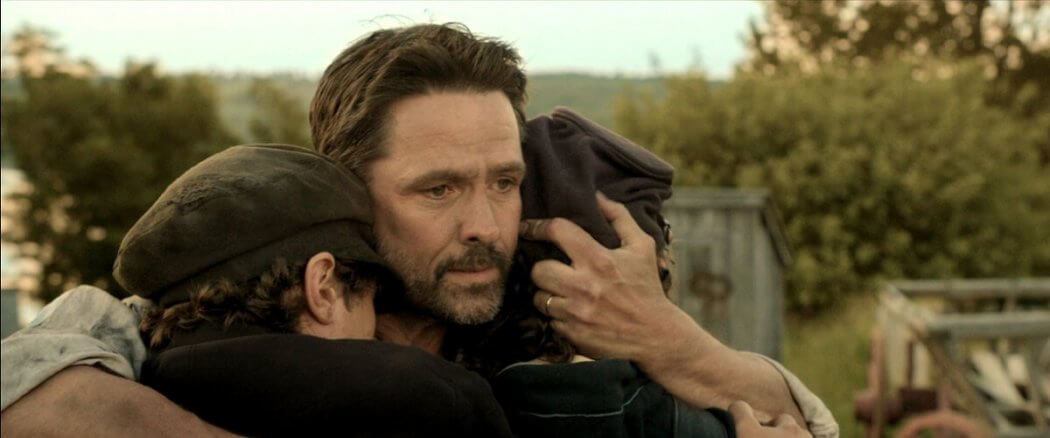For the most part we in the Northern states look upon the Civil War as a tragic but noble and necessary episode to preserve the Union. And most of us rank Abraham Lincoln as one of the greatest, if not the greatest of U.S. presidents. But we gloss over how much opposition to the war existed in the Northern states and how heartily Lincoln was detested and vilified not just in the South but by a significant proportion of the Northern populace. And we do not often mention the clearly illegal actions (by today’s standards at least) that Lincoln took to quell opposition to “his” war.
I am writing this review just after the two “patriotic” holidays of Memorial and Independence Day. Over those holidays my wife and I often try to view movies that remind us of the struggles this country went through to get where we are today… some that can be seen in a positive light and some not so much. This year for “The Fourth” my wife and I viewed Copperhead, the little seen movie from 2013 based on a short novel of the same name written in 1893 by Harold Frederic. The original book was made available in 2010 in a (poorly) digitized format by the University of North Carolina. Copperhead brings to light the deep divisions that existed in the Civil War North, showing Christians pitched against other Christians — both certain of the correctness of their arguments based on how they proof-texted the Bible.
Copperhead has one of those screenshots at the beginning of the film that says “Inspired by True Events” — but I wonder how “true” the events are since the story on which it is based makes no such claim. It was filmed on a minimal budget of $12 million (estimated). It still lost a considerable amount of money with a total US gross of just under $172 thousand — so I doubt there will be a sequel. It came out in late June 2013 around the same time as many of the action movies of that year (Man of Steel, Iron Man 3, Fast & Furious 6, Pacific Rim, The Wolverine and World War Z), quickly fading into obscurity and video. It was also poorly marketed, with my nomination for one of the top ten awful movie posters of all time (here). The featured poster shows the lead (barely recognizable) dressed as if he were a member of one of the Gangs of New York and looking as if he were about to beat someone to a pulp. I remember seeing that poster and saying “Meh, I’ll skip that one.” The second poster for the film can be seen at that same site and is significantly more illustrative of the themes of the film. I notice the scene on that poster is now the cover art on the front of the DVD.
The Making of the Film
Copperhead’s screenplay was adapted (from Frederic’s book) by Bill Kauffman who is paradoxically described as a “devout Roman Catholic,” “an intimate correspondent of the late Gore Vidal,” and “a libertarian despite being a registered Democrat who almost never votes for their candidates.” (See his interesting website at billkauffman.net.) His screenplay adheres to the book’s first half but then deviates in the second adding more drama and action, as well as Kauffman’s own dialogue that is both provocative and thoughtful. I understand why for the visual requirements of film the ending needed to be changed and I enjoyed both versions of the narrative. But I especially valued the added conversations that Kauffman inserted into his screenplay which are stirring and helpful for today’s audience to understand the heated emotions of the time.
 Copperhead was directed by Ron Maxwell of the Gettysburg and Gods and Generals epics– two films that a history aficionado like me enjoyed but many saw as interminably long and filled with bearded characters that could not be discerned one from the other. On the other hand noted film critic Roger Ebert lauded Gettysburg (considered the superior of the two films) as a portrayal that “avoids all war movie clichés… where we sense the sheer physical exhaustion of combat, the combination of fear, fatigue and determination… (and) where we experience the horrifying reality of battle itself.”
Copperhead was directed by Ron Maxwell of the Gettysburg and Gods and Generals epics– two films that a history aficionado like me enjoyed but many saw as interminably long and filled with bearded characters that could not be discerned one from the other. On the other hand noted film critic Roger Ebert lauded Gettysburg (considered the superior of the two films) as a portrayal that “avoids all war movie clichés… where we sense the sheer physical exhaustion of combat, the combination of fear, fatigue and determination… (and) where we experience the horrifying reality of battle itself.”
Obviously Maxwell is fascinated by the Civil War period, but he denies that Copperhead is the third of his promised trilogy of that era stating he is still working on that film. And this film contains not one single battle scene. He has apparently not done much in film since Copperhead and his previous two films were funded by the aging Ted Turner so it may be the trilogy will never be completed.
The Families
Set in 1862, the film opens in the fictional upper New York state village of Four Corners, which locals call “the Corners.” We are introduced to two families, one lead by Abner Beech (Billy Campbell who was so memorable in The Killing TV series — and who was a replacement for Jason Patrick who was “dismissed” after the first two weeks of the six week shoot by Maxwell for “failing to take direction”). Billy plays the part of a hard-working, successful farmer who lives with his wife M’rye and their near-adult son Jeffrey. There is also a boy Jimmy in the family (the quietly effective Josh Cruddas) who was “taken in” (legally or not is never made clear). In the novel Jimmy is 12 going on 13 years old and the story in the novel is told in Jimmy’s first person narrative. In the film he appears older (15 or 16?) but plays much less of a central role.
Abner’s nemesis is Jee Hagadorn, played darkly by Angus Macfadyen. He is a “cooper” or what we would now call someone who makes barrels (that is, if that is anymore an actual profession). Jee was one of the first of the area’s abolitionists, but with the fervor of Lincoln’s election and the early stages of the “War Between the States,” he becomes the vocal (some would say rabid) leader of the majority of the Corner’s residents. Jee’s wife died at a young age leaving him with a young adult daughter, Esther (the beautiful Lucy Boynton who plays a completely different character in the current Sing Street). Esther is now the teacher in their community’s one-room schoolhouse and dutifully follows her father’s political indoctrination. Jee also has a teen son Benaiah played engagingly by, at that time, 27 year old Augustus Pew (from Charlie St. Cloud and Kick-Ass 2 and who pulls off being a teen very well). See 1 Chronicles 11:22 if Benaiah sounds familiar – or not. He was one of David’s fearsome generals who, along with many other feats, killed a lion by jumping into a pit where the lion had fallen and doing battle with it. Called “Ni” for short (and much greater ease) Jee’s son is a happy-go-lucky spirit who initially seems to take nothing very seriously. Ni is saddened that his personality is so antithetical to his namesake knowing he has not fulfilled his father’s expectations. In one scene after Ni expresses some doubt as to the wisdom of Jee’s condemnation of the “copperheads” among them, Jee hugs and kisses him on the cheek, while incongruously saying “You’re a sore disappointment to me, boy. A sore disappointment.” Benaiah will be a central figure in the second half of the movie and you will come to admire his character, perhaps illustrating that wisdom is to be more admired than ferocity.
Abner vs Jee
Abner Beech is a learned man (despite almost every sentence he utters having the word “ain’t” in it). He has the largest library in the area from which he enriches his mind nightly. He is also a Democrat of that day (different than the current Democratic party, by the way). In addition, he is a prudent pacifist who believes in a nation going to war rarely if at all (as in the definition of a “righteous war” being one which God condones “only as a last resort and with tears in his eyes”). He feels that Lincoln’s urging the nation’s youth to enlist in a war against their “brothers” in an effort to keep the Southern states from seceding from the union is foolhardy and sinful, and that Lincoln is a bloodthirsty tyrant. He believes the idea of freeing black slaves is none of his business nor anyone else who lives in rural (New) York. When he and his family walk out of the community’s only “Union” church affronted by the minister railing against those who doubt the correctness of the war, Abner turns at the door and says to the startled congregation “’Blessed be the peacemakers.’ Is that still in the Bible?” Democrats who wanted peace made with the South were called “copperheads,” likening them to the venomous, deadly snake. Even more slanderous, their minister compares them to the “Beast” of Revelation 13:1 “having seven heads and ten horns, and upon his horns ten crowns, and upon his heads the name of blasphemy.” In the minister’s mind the names on the Beast’s heads are those of Democratic politicians and generals… maybe even the name of Abner Beech.
 Jee Hagadorn (Angus Macfadyen of Braveheart and We Bought a Zoo) on the other hand is a staunch abolitionist and Lincoln Republican who is all too happy to see Abner Beech forced to leave his leadership position in the church. He believes every resident of their tiny village must do their patriotic duty and is bitterly disappointed that Ni will not take up arms and volunteer to see action “before the war is over.” At this time the war has been a series of maneuvers and small skirmishes but no large-scale battles have yet occurred. That period of relative quiet will come to an end with the Battle of Antietam on September 17, 1862. With that terrible battle the war would be seen and felt much differently in the North. Wagons bearing caskets would begin to regularly appear along with men returning with missing limbs or horrible wounds. But at this time Jee sees nothing but heroism, glory and honor in pursuit of a quick victory. Jee makes every attempt to ostracize the Beech family from the community, having his fellow abolitionists at the local “butter factory” accuse Abner of watering down his milk — an almost intolerable insult to Abner who was one of the founders of the communal factory.
Jee Hagadorn (Angus Macfadyen of Braveheart and We Bought a Zoo) on the other hand is a staunch abolitionist and Lincoln Republican who is all too happy to see Abner Beech forced to leave his leadership position in the church. He believes every resident of their tiny village must do their patriotic duty and is bitterly disappointed that Ni will not take up arms and volunteer to see action “before the war is over.” At this time the war has been a series of maneuvers and small skirmishes but no large-scale battles have yet occurred. That period of relative quiet will come to an end with the Battle of Antietam on September 17, 1862. With that terrible battle the war would be seen and felt much differently in the North. Wagons bearing caskets would begin to regularly appear along with men returning with missing limbs or horrible wounds. But at this time Jee sees nothing but heroism, glory and honor in pursuit of a quick victory. Jee makes every attempt to ostracize the Beech family from the community, having his fellow abolitionists at the local “butter factory” accuse Abner of watering down his milk — an almost intolerable insult to Abner who was one of the founders of the communal factory.
Our youth always test our boundaries and ask “Why?” And the young people of these families are no different as they explore and find common ground. Inevitably, as scripts go, Jeff and Esther fall in love. Jeff, to prove his manhood to Esther and his allegiance to her father’s (and her) politics, enlists to go to war just in time to experience the horror of Antietam, with September 17th being the bloodiest day in American military history (over 3600 killed and 17,000 wounded in a single day – astounding numbers that the American public of this day would never tolerate).
But there are no battle scenes here, only the broken family and community bonds between people who have different beliefs — both sides justifying them with their cherished Biblical and political credos. So deep is Abner’s bitterness that he estranges himself from Jeff and does not allow his name to be spoken. (“He sowed. Now he must reap… He snuck out behind our backs to join Lincoln’s gang and levy war against countrymen of his (that) never done him no harm. Now I’m not one to lug scripture into an argument, like some I know. But my feeling is ‘Who so taketh up the sword shall perish by the sword.’”) And so deep is the division that the Hagadorns (even Esther who loves him) will only call Jeff by his middle name “Tom” so as to not bring up the specter of that hated traitor Jefferson Davis. When Jeff goes missing at Antietam and first Ni, then Esther, attempt to reach out to Abner and M”rye, they are rebuffed. Thus rises an increasingly bitter animosity between the two neighbor families which will eventually result in destruction and death.
The Conflict Laid Out
Peter Fonda, 73 years old but whose career peaked at 28 in Easy Rider, plays the blacksmith Avery (despite his lack of bulk and muscle that characterize most smithy’s). Fonda puts in what looks like a two or three day film schedule. He appears in only three scenes (only two with dialogue) which looked like they were written for him, having no parallel in Frederic’s book. However one of the scenes is a revealing conversation between his pro-war character and the contrarian Abner Beech where they represent the arguments for both sides. Here is part of that conversation that shows how conflicted the people of that time were:
Abner: It’s Abraham Lincoln and his Republicans tearing us apart and the Constitution. Closing down newspapers, putting critics in prison. Enlisting mere boys to fight in his unconstitutional war.”
Avery: Well what would you have President Lincoln do? The rebs fired first. Fort Sumter.
Abner: Should‘ve let the South go. They’d have not harmed us.
Avery: Not harmed us? Hell they’ve split the Union in two. Just so they could keep black men in bondage.
Abner: I am not a slaver. I’ve never even seen a slave. But the constitution says it’s none of York state’s business what Dixie does.
Avery (Disgusted): Those slave-o-crats… they’re not satisfied with their little corner of the country. They want to expand into Kansas, into Nebraska, into New Mexico. Good Lord, they want us to steal Cuba too. How does that fit your beloved Constitution?
Abner: I’m no party man. I’m no expansionist neither. I don’t want Cuba. Hell, I didn’t even want Texas. But I do not want our boys dying. And I don’t want the Constitution dying with them.
By the end of the film both sides have contributed to regretful behavior that results in tragedy. It is easy to be disheartened at both the opposing sides for their lack of reasonableness, but the passions of that time were not easily controlled. I felt that the way Abner distanced himself from how awful slavery was revealed a lack of empathy and an un-Christian nature, but so did the abolitionists blood-thirsty appetite for war and their condemnation of anyone who was skeptical. As a thoughtful and stammering Abner tells Jimmy, “War’s a… it’s a fever, son. It’s a fever, and you… you get het up, and the fever push you out of your right mind. You do things you wouldn’t do if you weren’t sick. You… kill, you maim. You lose sight of who you are, where you live. It’s like you’ve got no… no kin no more. No neighbors. You lose… you lose your bearings. And you… you ain’t who you really are.”
The Film
The film’s narrative is straightforward, if somewhat confusing at first due to each family’s political stance being plotted out. The scenes of farm life in the 1860’s were fascinating and brought back memories of old barns and factories from that time that I have been fortunate enough to see. Primarily filmed at the Kings Landing Historical Settlement in New Brunswick, Canada there is such beauty and nostalgia in the farm buildings, the saw mill, the maypole, the painted-bright-yellow general store and the pastoral scenes of the countryside. The portrayal of farming in the mid nineteenth century makes me realize once again how difficult life was in that time and how very blessed we are with all the leisure time and electronic conveniences we now have.
 The acting is dutiful although Billy Campbell rises above the others (despite his stylish 5 day stubble which I doubt was seen in that day and certainly does not fit Frederic’s description of Abner being a large, stout man having a thick, long beard). True to the novel, their English is not modern and my wife and I finally turned on subtitles as we struggled to understand their accents and stilted sentence structure. And that goes double for Abner’s Irish hired hand Hurley (played delightfully by Hugh Thompson) whose brogue is not intelligible — at least to these old ears.
The acting is dutiful although Billy Campbell rises above the others (despite his stylish 5 day stubble which I doubt was seen in that day and certainly does not fit Frederic’s description of Abner being a large, stout man having a thick, long beard). True to the novel, their English is not modern and my wife and I finally turned on subtitles as we struggled to understand their accents and stilted sentence structure. And that goes double for Abner’s Irish hired hand Hurley (played delightfully by Hugh Thompson) whose brogue is not intelligible — at least to these old ears.
The end of the film has some wonderful scenes of healing and forgiveness. Perhaps the resolution is too melodramatic for this day and age. But there is (SPOILER ALERT) a presentation of the homecoming of the prodigal son which is straight out of Luke 15 and which brought tears to my eyes. (I am always made emotional by that story as it is my story as well.)
An Aural Treat
Not since seeing Creed last fall have I experienced a film where the music was so prominent and enjoyable. Composer Laurent Eyquem won the 2013 International Film Music Critics Association “Breakthrough Composer of the Year” award for this film as well as his score for Winnie Mandela. He most recently scored USS Indianapolis: Men of Courage to be released sometime later this year. The music playing behind the prodigal son scene referred to above enhances the emotion of that moment, as the score does for many other of the key scenes. Lush strings alternating with country fiddle and plaintive ballads — there are not many soundtracks I seek out after seeing the movie but this was one of them.
A Civil War Story for This Age
See this movie to understand that there were two sides to the Civil War — and not just the North vs the South. See it to understand that in those times it was never completely clear that one side was correct and one was not. See it to remind yourself once again that war is terrible — both on the battlefields and, as shown in this film, on the home fronts. See it to remind yourself that the propaganda we are told at the beginning of all wars by both sides quickly turns to dust. See it to remind yourself of how passions often lead us, in many different ways, to make decisions we may regret our entire life. See it to witness the destructive nature of putting political beliefs above loving each other but also the power of forgiveness and love.
As Ni said, in his primitive English, near the end of Copperhead:
“Now I ain’t one for quoting chapters. But it seems to me one of the wisest things… ever told us was this: Love thy neighbor as thy self. I’m gonna say that again. Love thy neighbor as thy self. Seems to me we do an awful poor job of living up to that one. Oh, we love our neighbor just fine when the sun’s out and the crops are high and our neighbors’ agreeing with everything we say. Oh, we love him just fine. But he’ll be a bit ornery? Disagreeable? Maybe he’s just got a different way of looking at things. All of a sudden, we don’t love our neighbor so much anymore. In fact, we hate him. And we’ll call him names. We’ll burn his house down. Maybe even kill him. And all the while we sit in church mouthing the words to pretty little hymns that we don’t mean.”
We pray that such divisions never happen in the Christian church, or this “Christian” nation, again. But as we can see around us, perhaps that is a prayer too far. God make it not so.





